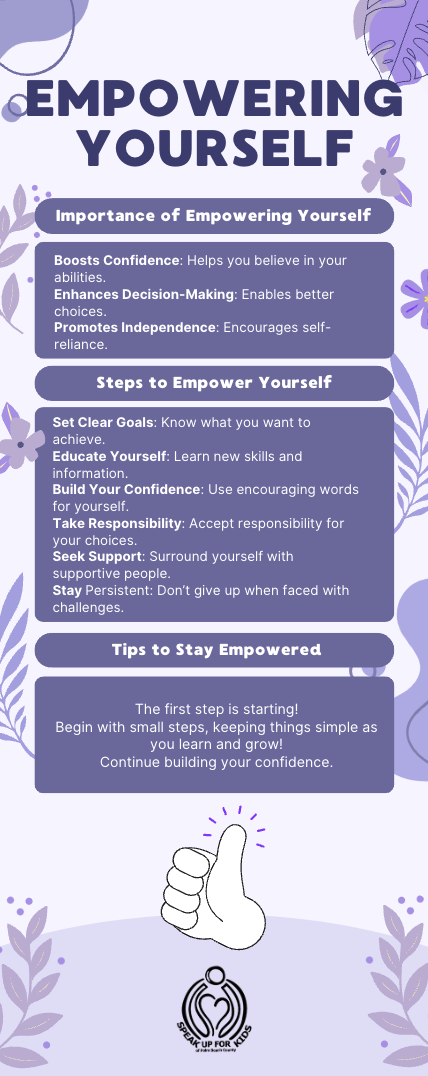Empowering Yourself
Contributed by Speak Up for Kids Student Intern Team — This article was developed through the combined efforts of multiple student interns, each bringing unique skills and perspectives to support life skills education for foster youth.
Overview
Empowerment is about taking control of your life, making positive choices, and taking action to achieve your goals. It involves building self-confidence, developing skills, and believing in your ability to influence your own destiny. Here’s a guide on how to empower yourself and what steps to take to become more self-reliant and confident.
Steps:
Understand What Empowerment Means to You:
Define Empowerment: Reflect on what empowerment means to you personally. This could be gaining independence, building confidence, or achieving specific goals.
Identify Areas for Growth: Determine which areas of your life you want to feel more empowered in, such as career, relationships, or personal development.
Set Clear and Achievable Goals:
SMART Goals: Set Specific, Measurable, Achievable, Relevant, and Time-bound goals. Clear goals provide direction and motivation.
Break Down Goals: Divide larger goals into smaller, manageable steps to make progress more attainable and less overwhelming.
Build Self-Confidence:
Positive Self-Talk: Replace negative self-talk with positive affirmations. Encourage yourself and acknowledge your strengths.
Celebrate Successes: Recognize and celebrate your achievements, no matter how small. This builds confidence and motivation.
Develop Necessary Skills:
Identify Skills Needed: Determine what skills you need to achieve your goals. This could be professional skills, communication skills, or personal development skills.
Seek Learning Opportunities: Take courses, attend workshops, read books, or find a mentor to help you develop these skills.
Take Responsibility:
Own Your Actions: Accept responsibility for your decisions and actions. This mindset helps you feel more in control of your life.
Learn from Mistakes: View mistakes as learning opportunities. Analyze what went wrong and how you can improve in the future.
Seek Support and Build a Network:
Supportive Relationships: Surround yourself with people who encourage and support your growth. This could be friends, family, mentors, or colleagues.
Professional Support: Consider seeking guidance from a coach or therapist if you need additional support.
Practice Self-Care:
Physical Health: Take care of your physical health through regular exercise, a balanced diet, and adequate sleep.
Mental Health: Engage in activities that promote mental well-being, such as mindfulness, hobbies, or spending time in nature.
Key Questions:
What Does Empowerment Mean to Me?
How do I define empowerment in my own life?
Which areas of my life do I want to feel more empowered in?
What Are My Goals?
What specific, achievable goals can I set to move towards empowerment?
How can I break these goals into smaller, manageable steps?
How Can I Build Self-Confidence?
What positive affirmations can I use to replace negative self-talk?
How can I celebrate my successes and acknowledge my strengths?
What Skills Do I Need?
What specific skills do I need to achieve my goals and feel more empowered?
How can I learn and develop these skills?
How Can I Take Responsibility?
How can I take ownership of my decisions and actions?
What can I learn from my past mistakes to improve in the future?
Who Can Support Me?
Who in my life can provide encouragement and support for my growth?
Are there professionals or mentors I can seek guidance from?
How Can I Practice Self-Care?
What activities can I engage in to take care of my physical and mental health?
How can I incorporate self-care into my daily routine?
Tips:
Be Proactive: Take initiative in your life. Don’t wait for opportunities to come to you; seek them out.
Stay Persistent: Persistence is key to empowerment. Keep pushing forward even when faced with obstacles.
Be Open to Learning: Embrace new experiences and be willing to learn from others. Continuous learning is a crucial part of empowerment.
Practice Gratitude: Regularly reflect on what you are grateful for. Gratitude can boost your mood and reinforce a positive mindset.
Final Thoughts
By following these steps and considering these questions, you can empower yourself to take control of your life, achieve your goals, and build the confidence needed to face challenges. Empowerment is a continuous journey of growth, self-discovery, and self-improvement.


